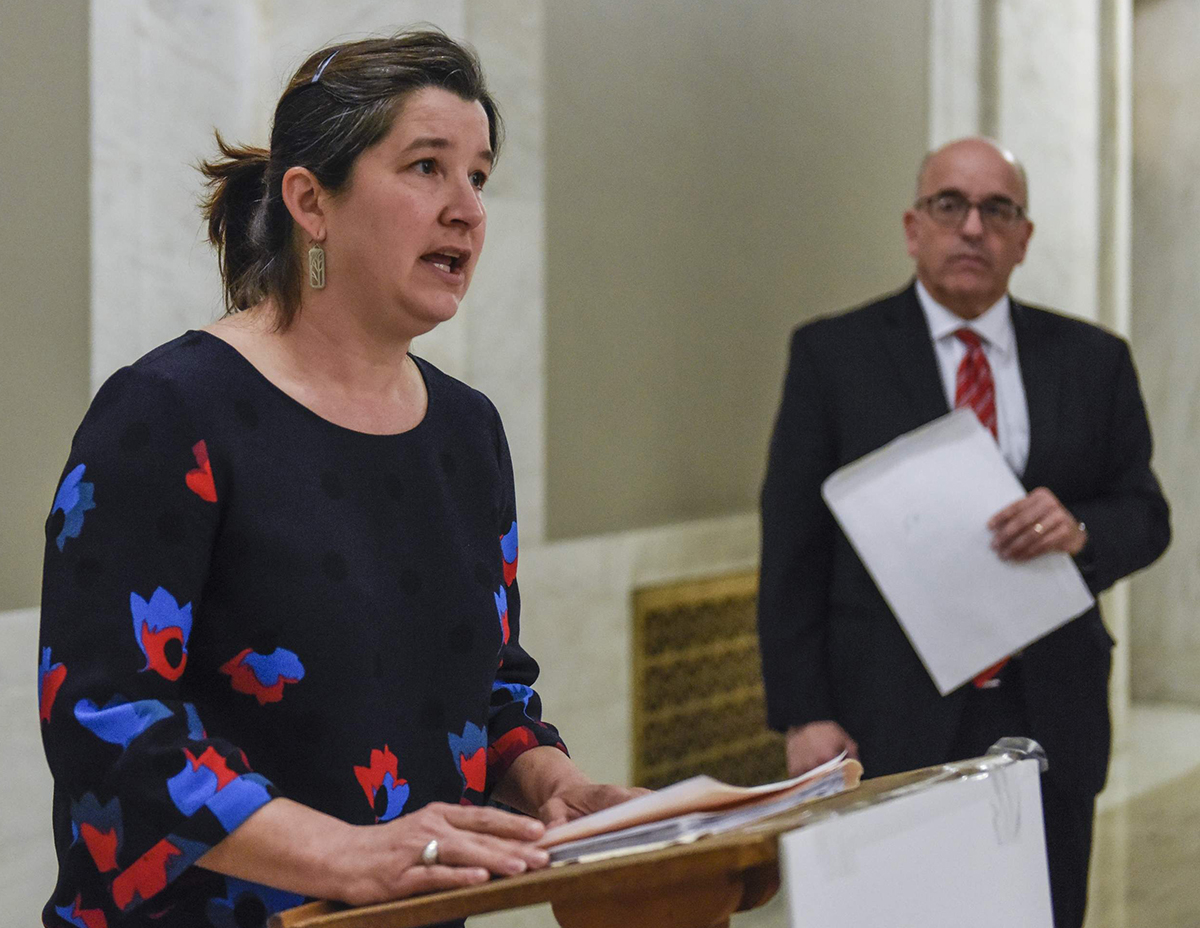By KEN WARD JR.
Charleston Gazette-Mail
CHARLESTON, W.Va. — Landowner groups and the West Virginia Farm Bureau tried Monday to drum up more opposition to an industry-backed bill in the Senate that would help natural gas companies force unwilling mineral owners to allow drilling.

(Photo by Sam Owens)
Opponents of Senate Bill 576 held a news conference just as the Senate was convening for its morning floor session, when the measure had been scheduled for potential amendments and a vote on passage. Senators held the measure over for another day. It’s scheduled for third reading, with a right to amend, during today’s floor session.
Charles Wilfong, president of the Farm Bureau, called the legislation a “total betrayal” of the property rights of West Virginians.
“We totally support the development of our oil and gas resources in West Virginia,” Wilfong said, “but our argument is [that] it needs to be done right. We must treat our landowners — surface and mineral owners — fairly, and protect their property rights.”
Wilfong spoke at a news conference that also was attended by a representative of the West Virginia Surface Owners Rights Organization. The event was organized by lobbyist Tom Susman, who represents Shiben Estates Inc., a land and mineral firm based in New Martinsville, in the middle of the state’s Marcellus Shale region. Other land and mineral owner groups also have expressed concern about the legislation.

“The gas producers have come to the Legislature and asked that the state of West Virginia take mineral owners’ property for the benefit of the corporate shareholders of these large multi-national gas-producing companies,” said a two-page “The Case Against Senate Bill 576” document that Susman distributed at Monday’s news conference. “They want the state to take care of Wall Street, not Main Street.”
SB 576 aims to make it easier for companies to ignore the wishes of unwilling co-owners of minerals and to impose modern horizontal drilling techniques, despite leases written years before such methods were contemplated. The legislation’s goal is similar to that of the “forced pooling” bill that went down in the House two years ago in a rare tie vote fueled by an unusual coalition of Democrats and Republicans who shared a concern for private property rights.
The latest version of SB 576 would allow drilling over the objections of a co-owner of mineral rights if the co-owners who favor drilling represent at least three-fourths of the mineral ownership. It also would allow drilling of multiple contiguous leases with horizontal drilling rights, as long as the leases don’t expressly prohibit horizontal drilling. With horizontal drilling — a technique not used when many West Virginia mineral leases were written — gas companies can drill not just down, but horizontally, allowing one well to capture gas from a larger area.
Industry lobbyists, the Republican legislative leadership and Democratic Gov. Jim Justice support at least some form of this type of legislation. They say it is needed for natural gas companies to pool sufficient tracts of land and gas reserves for large-scale horizontal drilling and hydraulic fracturing in the Marcellus region.
But land and mineral owners are upset, partly because the gas industry is seeking to have lawmakers step in to allow modern drilling practices, but isn’t also willing to do as much as land and mineral owners would like to also modernize the royalty rates paid by gas producers to the companies and individuals who own the minerals.
Julie Archer, project manager with the West Virginia Surface Owners’ Rights Organization, said her group appreciates efforts by the Senate Judiciary Committee to improve the bill but that the legislation still lacks adequate protection for surface owners.
Wilfong said requiring gas companies that force drilling onto unwilling mineral owners to reach surface use agreements — about things like where roads and drill pads are located — is crucial for the state’s rural residents and farmers who want to protect their farms or homeplaces.
“It can make the difference between devastating their farms or being something they can work around,” Wilfong said.
As of Monday afternoon, the Legislature’s website listed only one amendment to be considered on the floor for SB 576.
That amendment, proposed by Sen. Mike Romano, D-Harrison, would allow unwilling mineral owners who are being forced into gas-drilling pools to seek a review from the state Oil and Gas Conservation Committee of what the “just and reasonable consideration” should be for their mineral property.
During committee discussions, Romano has complained that the legislation didn’t provide due process for mineral owners whose property would be taken from them by gas drillers under provisions of the bill.
See more from the Charleston Gazette-Mail





